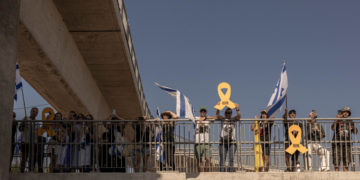Brushing aside pleas from allies and the demands of Israeli protesters for an immediate cease-fire in Gaza, Prime Minister Benjamin Netanyahu of Israel on Monday vowed to keep an Israeli troop presence along the border between Egypt and Gaza, a contentious plan that appeared to dim, if not dash, prospects for a truce.
In his first news conference since the bodies of six slain hostages were recovered over the weekend, Mr. Netanyahu told reporters on Monday night that, to ensure its security, Israel needed to assert control over the border in Gaza, known as the Philadelphi Corridor, calling it the lifeline of Hamas.
Hamas has said the occupation of the corridor is a nonstarter in negotiations for a truce.
“If we leave, we will not be able to return,” Mr. Netanyahu said of the corridor, as a large crowd protested near his private residence in Jerusalem on Monday night.
Mr. Netanyahu made the comments a day after the Israeli military announced that the six hostages had been found dead in a tunnel underneath the southern Gaza city of Rafah, a discovery that spread grief and outrage inside Israel and spurred both the mass protests and a widespread work stoppage.
In the hours before Mr. Netanyahu spoke on Monday night, two close allies of Israel signaled their impatience with the direction of the war in Gaza.
President Biden issued a one-word condemnation of Mr. Netanyahu’s unwillingness to compromise to reach a cease-fire and hostage release deal. Asked a series of questions by reporters about whether the Israeli prime minister was doing enough for a deal to get back the hostages, he said simply “No.”
And Britain announced that it would suspend the exports of some weapons to Israel, a significant hardening of its position on the war in Gaza under a new Labour government. Foreign Secretary David Lammy said the decision was based on a legal review that concluded there was a “clear risk” that the weapons could be used in a way that would breach international law.
Mr. Netanyahu suggested on Monday that the pursuit and killing of Hamas militants in Gaza would go on unabated. “We are close to crushing Hamas, we are crushing Hamas,” he said.
Hamas, he added, “would pay a heavy price” for the deaths of the six hostages and he questioned what message it would send if Israel let up in the fighting. “Slay hostages and you’ll get concessions?” he asked.
The failure of the protests and labor strikes to persuade Mr. Netanyahu to change course appeared to be a reflection of the increasingly deep fissures in Israeli society over the course of the war. Mr. Netanyahu’s hawkish right-wing allies are urging the destruction of Hamas militants in Gaza, scoffing at calls for an immediate cease-fire as tantamount to capitulation.
Flights at Ben-Gurion International Airport were disrupted for two hours on Monday morning, protesters blocked intersections in some Israeli cities, and schools and banks and some municipal offices closed or cut services in response to the call for a strike by Israel’s largest labor union. But there were also many signs of business as usual across the country.
Many municipalities continued work as normal, and some transport services returned to operation by Monday afternoon. In Jerusalem, where few shops were closed, Yaakov Levi, 60, the owner of a wine store, said he was sympathetic to the protests, but questioned whether a strike would achieve anything.
“Shutting down the market won’t change the opinion of the government’s decision makers,” he said.
Union leaders agreed to halt the labor strike at 2:30 p.m. local time, more than eight hours after it began, after a court said the organizers had not given enough notice for the work stoppage to go ahead.
The protests in Tel Aviv on Sunday night were the largest of the war, an outpouring of grief over the death of the six hostages.
On Monday thousands of mourners gathered in a cemetery in Jerusalem for the burial of one of the hostages, Hersh Goldberg-Polin, an Israeli-American whose parents had crisscrossed the globe to lobby for their son’s freedom, meeting with President Biden, United Nations Secretary General António Guterres and Pope Francis.
The funeral was attended by President Isaac Herzog of Israel who spoke of the plight of the remaining hostages in Gaza, pressing the country’s leaders “to save those who can still be saved.”
“This is not a political goal, and it must not become a political dispute,” he said. “It is a supreme moral, Jewish and human duty of the state of Israel to its citizens.”
The Biden Administration has insisted that it retains hope for a cease-fire in Gaza and a return of the 100 or so hostages, both those still alive and the bodies of those who have died. Asked on Monday by reporters whether he’ was planning to present a final hostage deal this week, Mr. Biden responded “We’re very close to that.”
Members of the U.S. team trying to negotiate a cease-fire huddled with Mr. Biden and Vice President Kamala Harris on Monday and “discussed next steps,” according to a statement issued by the White House.
Tor Wennesland, a senior U.N. official who visited Gaza on Monday, painted a picture of desolation and despair.
“The scale of destruction is immense, the humanitarian needs are colossal and soaring, and civilians continue to bear the brunt of this conflict,” Mr. Wennesland said. “I unequivocally condemn the horrifying civilian death toll in Gaza.”
Medical teams distributed polio vaccines on Monday, the second day of an urgent campaign to stem the spread of the crippling disease. The United Nations has described the emergence of polio, a disease eradicated from most of the world, as a measure of the collapse of Gazan society and infrastructure after nearly 11 months of bombardments.
The post Netanyahu Stands Firm on Cease-Fire Terms Amid Growing Outrage in Israel appeared first on New York Times.



















